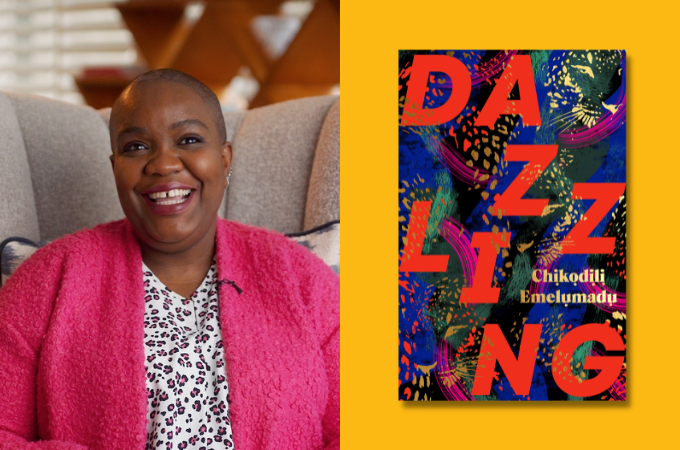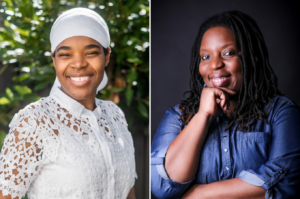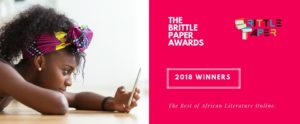
Nigerian and British author Chịkọdịlị Emelụmadụ just released her debut novel Dazzling this February in the UK. In a conversation with Brittle Paper, she shared with us her fascination with the secret societies in Nigeria, the influences behind her take on West African mythology, and the significance of giving power to female characters in narratives.
The story involves two young girls with missing fathers and supernatural forces surrounding them. Treasure’s father has just died and she has lost everything, but then she meets a spirit at the market who promises to bring her father back to life if she’ll do one thing for him. Ozoemena’s father vanished a while ago, but made her promise to fulfill her patrilineal destiny by becoming a Leopard and defend the land and people, an honor never before bestowed upon a girl. Things begin to intensify as Ozoemena’s classmates begin to vanish at her boarding school and Treasure’s obligations to the spirit escalate. The novel comes out this December in the US.
***
Brittle Paper
Hello Chikodili, Congratulations on the new book! Your journey as a writer has been rewarding to watch. It did not happen overnight. Now that you have your first book out, is the experience everything you dreamed it would be?
Chịkọdịlị Emelụmadụ
Thank you so much, and no! Not at all. I don’t think the reality will ever match the dream, much in the same way that a story idea is not exactly like the finished product. There is a lot of refinement, or in this case, many more steps than I imagined. In terms of reception, however, it has been pretty much as expected. I’m pretty thrilled because the main thing is that I wrote the book I wanted to write, and I have had immense support from my agency and publishers on my lead debut title which has been astonishing. Just waiting for the film option to happen.
Brittle Paper
I like to ask authors to describe their book. It intrigues me to hear how they summarize their stories.
Chịkọdịlị Emelụmadụ
Dazzling is a story of ancestry, love and power. It’s a story about two girls dealing with ancestral spirits out of love for the people in their lives even as society tries to strip them of power. All against the backdrop of their country’s transition from military to civilian rule.
Brittle Paper
How did you come up with such a brilliant idea for a novel?
Chịkọdịlị Emelụmadụ
I’m not sure I can say how I came up with the idea for Dazzling. It came about as a result of living and experiencing life, and having interests in certain things like secret societies, specifically the Leopard Society that was prevalent in eastern Nigeria in pre-colonial/immediate post-colonial Nigeria. When I was little – about seven – I read a book called The Bottled Leopard by Vincent Chukwuemeka Ike and that was what started my obsession with secret societies, both of the war variety and otherwise; Freemasons, Knights Templar (the subject of many films), The Illuminati, Abakua, Ogboni etc. Leopards are sacred and revered in Igbo culture (as well as many other West African cultures) and leopard societies spread with slavery. It’s fascinating stuff.
Brittle Paper
The idea of the Leopard is based on real sociocultural phenomena, right? Can you tell us more about the Leopard Societies of Eastern Nigeria?
Chịkọdịlị Emelụmadụ
They were societies who (believed they) imbibed powers of the leopard – cunning, strength – in order to keep law and order in their communities. Not quite extrajudicial but skirting on the cusp, it was their job to punish crimes through methods which in themselves were considered taboo. Crimes against man but also against nature, such as rape, incest, adultery etc. It is worthy of note that both men and women were equally punished, which is one of the things that attracted me to the idea of them. It was balanced, not unfair. Of course, as with all things where people or a group of people have ultimate power, there were allegations of corruption within these groups leading people to eagerly betray them to the British authorities, seeing as the Leopard Societies were also fighting British influence.
A lot of what I found out about Leopard Societies was written from the outside looking in (by colonial powers) so I am loathe to go too much into ‘Were they or weren’t they’, choosing to rely instead on information I received from my community or anecdotally.
Brittle Paper
I am curious about how much Igbo cosmology influenced the crafting of characters and the novel’s fictional world.
Chịkọdịlị Emelụmadụ
I haven’t studied Igbo cosmology formally but my idea of how things are comprised are only partially based on stories and the other part on my understanding of the multiverse theory. Recently, however, I have started reading An Orchestra of Minorities by Chigozie Obioma, since apparently there is a similarity to my work. In it there is a map of the Igbo cosmos which differs somewhat to my idea of what to expect but is still within acceptable bounds. I think that a lot of ancient Igbo knowledge predates theories in physics but their similarities are astounding. How, in the absence of modern tech and men walking on the moon, did they know? How did ancient Greeks know? Ancient Egyptians? It’s all fascinating stuff.
Brittle Paper
I didn’t go to boarding school, so I find the genre endlessly fascinating. How did your personal experience with being in boarding school inform your depiction of Ozoemena’s school and her friends?
Chịkọdịlị Emelụmadụ
Well, I first went when I was nine, to another state, away from my parents, to a school which had no gate because it was so deep in the hinterlands – or so we thought – that escape was futile. That sort of thing marks a person. I was young and it was my first time away from home. I did go to another boarding school after a year, but I am 100 percent boarding-school formed. It’s tough to shake the influence.
Brittle Paper
The first time the leopard’s spirit is passed on to a female, it is to Ozoemena, a very young girl. I have a daughter and it makes a whole lot of sense to me that the power to protect cosmic order would be handed to a little girl. But can you explain that creative decision to people who may wonder.
Chịkọdịlị Emelụmadụ
Gladly! I am one of five girls myself so why not? My whole worldview has been formed by being one of five girls, of parents who were hyper-visible and influential in society, in a place where having boys is considered the epitome of parenthood. The physical Leopard Society, no matter what they believed, was made up solely of men. Their physical prowess was required at the time they existed. The way I see it, whatever wars are being waged for the souls of societies at the moment are mental and emotional, ‘spiritual’. There is a lot of appeal to people’s hearts and minds, and, since women are considered more evolved intuitively, it made sense that my champion of the era be female. That way at least we will all stand a chance.
Ozoemena is cautious and deliberate, a bit of an outsider. She does not act without first thinking things through. I needed someone who was used to not belonging by virtue of her being displaced. She was born abroad and raised in Nigeria, returning after childhood friendships and bonds have been formed. There is also her being a sort of ‘second class’ citizen in her world because of her sex. Leopards are brave, yes, but they are also cunning because they are solo hunters. They take every advantage they are offered despite their strength – they are efficient hunters. By being othered, Ozoemena develops empathy. The Leopard in Dazzling is not a position for someone who was born into privilege in society, like a man would be.
Brittle Paper
In bringing Ozoemena and Treasure’s worlds into being, in giving their stories life and their bodies flesh, and making them larger than life in spite of their youth, which literary ancestors, influences, or experiences did you draw from?
Chịkọdịlị Emelụmadụ
Ooh, I am not certain about this. I’ve read thousands of books and there is no way of saying what my influences are, apart from the first: The Bottled Leopard by Vincent Chukwuemeka Ike. I owe him a debt of gratitude for introducing the Leopard Society as a concept into my six or seven-year-old consciousness. The rest of it is drawn from life; meeting people, talking to them, going to boarding school, existing, reading the news, watching TV, gossiping, being told tales, dreams, history, research, elders, and priests.
Brittle Paper
Thinking more broadly – from Tomi Adeyemo’s Orisha-inspired worlds and Namina Forna’s Deathless series to Tendai Huchu’s Library of the Dead – it feels like we are in the midst of an African mythology renaissance. Why do you think more and more writers are exploring the world-building possibilities in African myths and cosmologies at this particular moment?
Chịkọdịlị Emelụmadụ
No idea. There is a reason Dazzling is my first book – I was unwilling to let it be anything else, so I am glad that the time for it seems to have arrived. I never had to bend, I just had to keep doing what I was doing while I waited for the world to catch up. We have always been here. It’s a good thing this is happening.
Brittle Paper
I am interested in how digital technology changes the way stories are told. Dazzling is set in the 1990s, during Babangida’s regime (right?), meaning that there are no cellphones, and the Internet plays no role in the story. Would Dazzling have been that much of a different novel if it were set in a world with smartphones, the internet, and social media?
Chịkọdịlị Emelụmadụ
Hmmm. Maybe. For one thing, the disappearance of the girls would have been much louder given the advent of social media. It would have been quite difficult for the school to continue to operate after students went missing. However, it’s interesting how often things go under the radar despite social media and cellphones, etc. People still disappear without a trace, and often aren’t found. And as for the girls Ozoemena and Treasure, they would not have owned cellphones anyway. Combined with the fact that they are girls, children in Nigeria, and that their worlds are largely disparate, I reckon most of Dazzling would remain unchanged. Great question!
Brittle Paper
Let’s talk about your writing. Ever since I taught your story “Bush Baby” in my African SFF course, I stopped trying to force your style into a genre. You draw from so many different elements. How would you describe your writing style? How did you develop it? Who influenced you?
Chịkọdịlị Emelụmadụ
I have absolutely no clue. This is just one of those questions that always throws me for a loop given that I read avidly and widely as a child. I have no favorite books or authors or anything like that, just a thirsty, thirsty sponge soaking everything up; plays, poems, articles, cartoons, essays, manuals too.
Brittle Paper
Do you find the question of genre interesting as a writer? For example, do you find that there are things that speculative fiction allows you to do that realist fiction cannot?
Chịkọdịlị Emelụmadụ
‘Speculative’ fiction is ‘realist’ fiction. They are either based on beliefs people hold to be true or tech that’s in development. Look how far we have got in 10 years with new technologies. There is not as much of a dichotomy as we believe especially in African cultures. We exist alongside the supernatural and mythical, tech and future tech every day. People are open to new concepts, new innovations and beliefs because we accept the unexplainable and unexplained. I like that elasticity, the way we are flexible in our thinking.
Brittle Paper
Are you the kind of writer who agonizes over every little thing or are you generally okay with imperfections?
Chịkọdịlị Emelụmadụ
If I see an imperfection, I will not let it go, if that’s what you mean. I used to be a lot worse and I would worry at something until my mind crumbled. Nowadays, I am more confident as a writer. I know I will always find a solution so I am willing to relegate it to my subconscious and trust my brain to work it out.
Brittle Paper
Were there moments during the drafting when you felt stuck? What helped you to figure things out?
Chịkọdịlị Emelụmadụ
Yes, I did feel stuck a few times. I have almost half a million words of various versions of Dazzling. I couldn’t figure out what POV I wanted both girls to have so I kept switching. Treasure’s voice was pretty clear to me but the POV thing was hard because there are many moving parts and I hated the way some of the action sounded from a particular POV. For this book, I worked it out over and over, there was no passivity, no relegating to the background. I was tormented. I was distraught. I think it was sheer doggedness that helped, but it is worthy of note that the solutions showed up while I was at rest or otherwise occupied, like in the shower.
Brittle Paper
Which characters were the most difficult to work on or work with?
Chịkọdịlị Emelụmadụ
I couldn’t say. I know my characters so thoroughly that even their backstories are clear to me. The difficulty was in not overwhelming the book with all that information.
Brittle Paper
The responses to the novel have been positive so far. What kind of life are you hoping this book will have in the world?
Chịkọdịlị Emelụmadụ
I’m hoping that Dazzling outlasts and survives me, my children, and grandchildren, if I have them. I hope it stays long enough for its copyrights to expire so that other people might expand upon its world. That would be the dream.
Brittle Paper
It was lovely chatting with you, Chịkọdịlị. Thank you!
***
Buy Dazzling by Chịkọdịlị Emelụmadụ: Amazon (UK) | Amazon (US) | Bookshop (US)








COMMENTS -
Reader Interactions